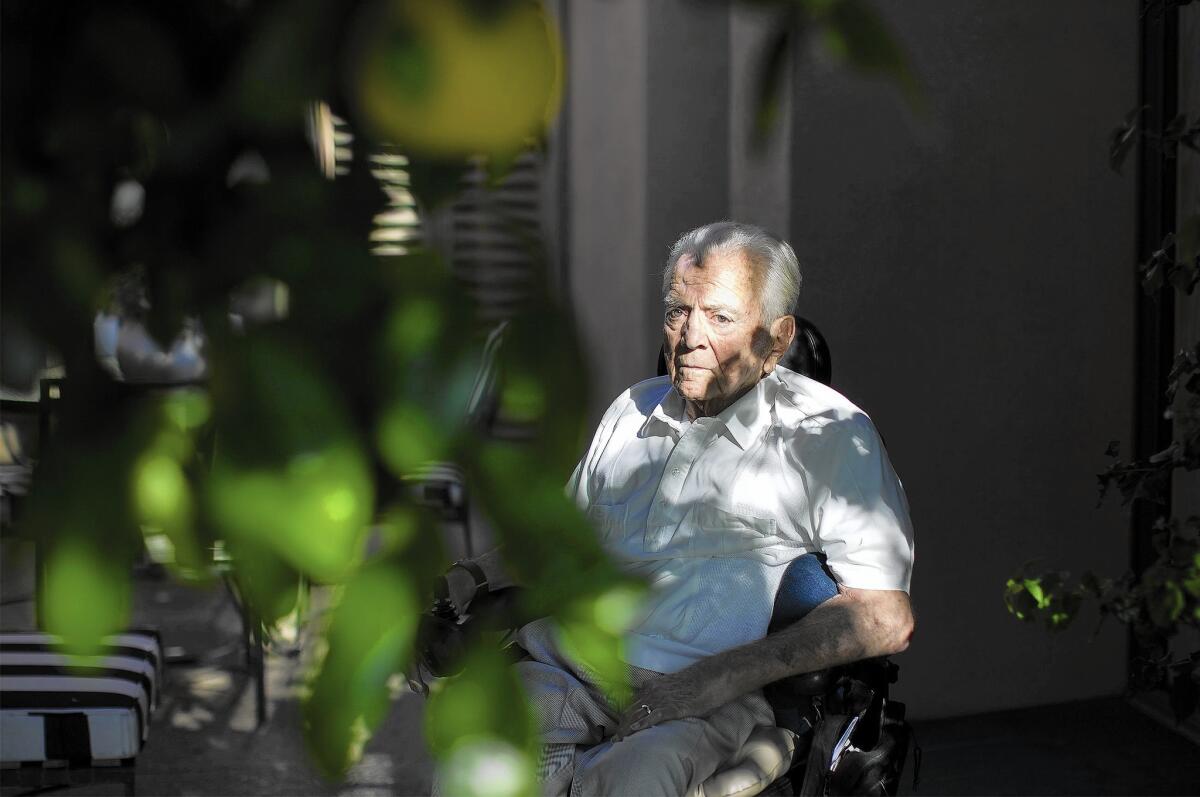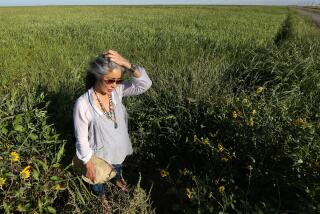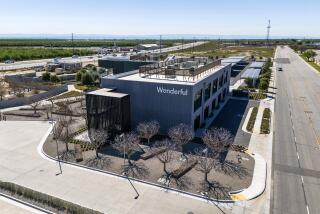Harold Parichan dies at 92; attorney, almond farmer fought California bullet train project

Harold Parichan spent sleepless nights worrying about the California bullet train.
Over dinners with his daughter and sons, he would ponder the fate of his prized almond orchards in Madera County, which would be sliced diagonally by the future tracks.
Disabled since polio struck him in the 1920s, Parichan overcame many obstacles, attending UC Berkeley and Stanford University law school on crutches and braces. But the bullet train became one of the biggest emotional challenges in his life, and time was running out for the 92-year-old farmer.
Parichan died Wednesday in Fresno after a bout with the flu, leaving his fight to keep the train off his farm unfinished.
Sue Parichan Habild, who worked with her father for decades, vowed that the family would continue his fight.
We would be there for dinner, and all we would talk about was the bullet train. You could see how angry he was. I’m sure it affected his health.
— Sue Parichan Habild, Harold Parichan’s daughter
“We would be there for dinner, and all we would talk about was the bullet train,” she said. “You could see how angry he was. I’m sure it affected his health.”
The battle that Parichan waged against the $68-billion project is part of a deeply emotional land war that has drawn in hundreds of farming families from Merced to Bakersfield.
The refusal of farmers to sell out is a large part of the reason that the project is now more than two years behind schedule and massive earthmoving machinery is parked idle in Fresno, as the bills mount and the frustration of project supporters grows.
Join the conversation on Facebook >>
The Central Valley farms in the way have been handed down from generation to generation, and the current owners believe they have a debt to their parents and grandparents.
“I hate to say it, but it is an obsession with me,” said Kole Upton, a Stanford engineering graduate and almond farmer who was a friend of Parichan. Upton’s own 1,000-acre almond farm lies in the high-speed rail line’s path, and he has been fighting to keep his land intact for years.
‘If I go down, I will go down fighting to my last dollar,” he added. “My daughter and son and their families live with me on my land. I know how Mr. Parichan felt.”
Dan Richard, the rail authority board chairman, said he has attempted to engage with farmers and understands their opposition, but in the end the taking of their land is unavoidable.
“It comes with the territory,” he said at a board meeting in 2013.
Despite Richard’s resolve, the state has fallen far behind schedule. It was supposed to be more than halfway toward building the first 29 miles of rail structures from Madera to Fresno, but it has turned over only half the necessary land to its contractor, Tutor Perini.
Parichan was a formidable opponent.
“They are raping my ranch,” Parichan said in a 2015 interview. He was himself an accomplished attorney, wealthy and committed to fighting a project that be believed was misguided. He hired a former federal judge, Oliver Wanger, to represent him.
“He was the strongest person I ever met, a great soul,” said Adrian Valdez, Parichan’s caregiver for seven years. “He fell constantly and broke every bone you could think of: his legs, his hip, his neck. He always bounced back and continued his life as normal as possible. Struggling with polio, you would think he would have a hard time with life, but he loved life.”
Valdez said Parichan’s fight against the bullet train changed him. “It really did a number on him. It took away his peace. He would be awake at night thinking about it.”
Parichan was born Nov. 23, 1923, in Reedley, the son of an immigrant cobbler from Armenia.
As a young boy, he underwent numerous experimental surgeries for his polio, including the removal of his ankle at a Los Angeles hospital. After graduating from UC Berkeley, he went to Harvard Law School. But he left for Stanford because the harsh Eastern winters made it too difficult for him to get around campus.
NEWSLETTER: Get the day’s top headlines from Times Editor Davan Maharaj >>
By then, he had married Edna Elizabeth Schramm, the daughter of a German farming family in the Central Valley. After graduating, he opened a law office Fresno with other attorneys. He built a reputation as a tough corporate defender, representing General Motors, Ford and gunmaker Sturm Ruger in some of the biggest product-defect cases in history.
But when he fell on the courthouse steps in the late 1990s, he decided it was time to give up his law practice. He had been drawn to farming after spending decades listening to his wife’s family talk about their land, Habild said.
He had amassed a fortune as an attorney, living in a home on the banks of the San Joaquin River in Fresno. He had a second home at the Vintage Club, the gated Indian Wells community where Bill Gates and other wealthy Americans have homes.
While the love of his land gave him motivation to fight the state, the almonds gave him the money to accomplish it. He was harvesting 2,500 acres of almonds, which produced annual revenue of more than $13 million.
The rail authority has designated a route that would cut through seven of Parichan’s almond orchards, severing irrigation systems and cutting off hundreds of acres from tractors, he said. The initial offers that the state made represented only a small fraction of the value of the land, he said.
So far, the state hadn’t moved legally against Parichan, as it has with other farmers, but he had expected an eminent domain action to acquire the property.
Michael Brady, a Bay Area attorney who was among Parichan’s friends and is representing other farmers in the Central Valley, said the urban dwellers of the state cannot comprehend the scope of the legal battles that are occurring.
“These are wonderful people, very strong,” Brady said. “They love their land and love their way of life, unlike many people in California who jump here and jump there.”
Parichan is survived by his wife, Edna, and three children, Rod Parichan, Tim Parichan and Sue Parichan Habild. He has six grandchildren, including Reid Parichan, who manages the almond farm.
Twitter: @rvartabedian
ALSO
LAPD seeks suspect in monthlong series of violent crimes
Richard Moore, Santa Monica College president for 20 years, dies at 82
First in series of storms forecast for Southland expected to hit Sunday night
More to Read
Start your day right
Sign up for Essential California for the L.A. Times biggest news, features and recommendations in your inbox six days a week.
You may occasionally receive promotional content from the Los Angeles Times.







